Azurswap vs. Major DEXs Comparison Tool
Azurswap
Fee: Not Disclosed
TVL: Not Reported
Networks: Claimed Many EVM
Security: No Public Audits
Uniswap
Fee: 0.30%
TVL: $4.2B
Networks: Ethereum, Optimism, Arbitrum, Polygon, BNB Chain
Security: Multiple Audits
PancakeSwap
Fee: 0.25%
TVL: $1.8B
Networks: BNB Chain, Polygon, Avalanche
Security: Audits + Bug Bounty
Detailed Metrics Comparison
| Aspect | Azurswap | Uniswap | PancakeSwap |
|---|---|---|---|
| Swap Fee | Not Disclosed | 0.30% | 0.25% |
| Total Value Locked (TVL) | Not Reported | $4.2B | $1.8B |
| Supported Networks | Claimed Many EVM Chains | Ethereum, Optimism, Arbitrum, Polygon, BNB Chain | BNB Chain, Polygon, Avalanche |
| Security Audits | None Public | Multiple Third-Party | Audits + Bug Bounty |
| Community Size | Negligible Online Presence | Large, Active Forums | Large, Active Forums |
Risk Assessment
Potential Risks
- Unclear fee structure
- No public security audits
- Missing TVL and liquidity data
- Minimal community presence
- Limited network transparency
Recommended Approach
- Use only small test amounts
- Verify contract addresses
- Stick to well-established DEXs for major trades
- Monitor for future disclosures
- Only use risk capital
Quick Take
- Azurswap is a little‑known multi‑network DEX with almost no public data.
- Fees are advertised as low, but exact percentages aren’t disclosed.
- Security details, KYC policy, and liquidity numbers are missing.
- Established rivals like Uniswap and PancakeSwap offer transparent metrics and larger communities.
- Proceed with caution - treat Azurswap as a high‑risk experiment.
When you type "Azurswap" into a search bar you’ll quickly notice the silence. The platform shows up on CoinMarketCap, claims to support the "highest number of EVM networks," and bills itself as a low‑fee DEX. But the details that matter to traders - fee schedules, security safeguards, liquidity depth, and community feedback - are virtually absent. This review pulls together the bits of information that are publicly available, lines them up against the big players, and gives you a clear picture of whether Azurswap belongs in your trading toolbox.
What is Azurswap?
Azurswap is a decentralized exchange (DEX) that positions itself as a multi‑network platform supporting several Ethereum Virtual Machine (EVM) compatible blockchains. The service operates without a central order book, letting users swap tokens directly from their wallets. Unlike centralized exchanges, Azurswap does not hold custody of your funds - the smart contracts hold the liquidity pools.
Core Claims and How They Stack Up
The site’s marketing highlights three main selling points:
- Multi‑network reach - Azurswap says it connects the “highest number of EVM networks,” but it never lists them. Competing DEXs typically name networks explicitly (e.g., Uniswap supports Ethereum, Optimism, Arbitrum, Polygon, and BNB Chain).
- Low transaction fees - No specific maker or taker percentages are published. By contrast, Uniswap charges a flat 0.30% fee per swap, while PancakeSwap’s fee sits around 0.25%.
- Easy wallet integration - The platform works with MetaMask, Trust Wallet, and other standard Web3 wallets, a baseline expectation for any modern DEX.
Because the promised features aren’t backed by data, you’re left guessing how the platform performs in real‑world conditions.
Fee Structure - The Missing Piece
Fee transparency is a trust signal. Users can calculate expected costs, compare across markets, and avoid hidden slippage. Azurswap’s lack of disclosed fees makes it impossible to run those calculations. If you’re a trader who counts every basis point, this opacity is a red flag.
For reference, here’s a quick snapshot of fee models on major DEXs:
| Exchange | Standard Swap Fee | Additional Costs |
|---|---|---|
| Uniswap | 0.30% | Gas fees (Ethereum network) |
| PancakeSwap | 0.25% | Gas fees (BNB Chain) |
| Azurswap | Not disclosed | Unknown - depends on network used |
Until Azurswap publishes an official fee schedule, you’re essentially trading blind.
Security & Regulatory Snapshot
Every reputable DEX lists at least three security pillars:
- Audited smart‑contract code (usually a link to a report from Certik, ConsenSys Diligence, or similar).
- Optional two‑factor authentication for the web interface.
- Clear KYC/AML policies for users who need to interact with fiat on‑ramps.
Azurswap provides none of these details publicly. No audit reports, no mention of cold‑storage strategies, and no regulatory jurisdiction are disclosed. Compare that with the following:
Uniswap is an open‑source DEX that undergoes regular third‑party audits and publishes the reports on its documentation site. PancakeSwap similarly shares audit findings and offers a bug bounty program.
In a market where scams and phishing attacks are rampant, the lack of visible security measures should push most traders to the sidelines.
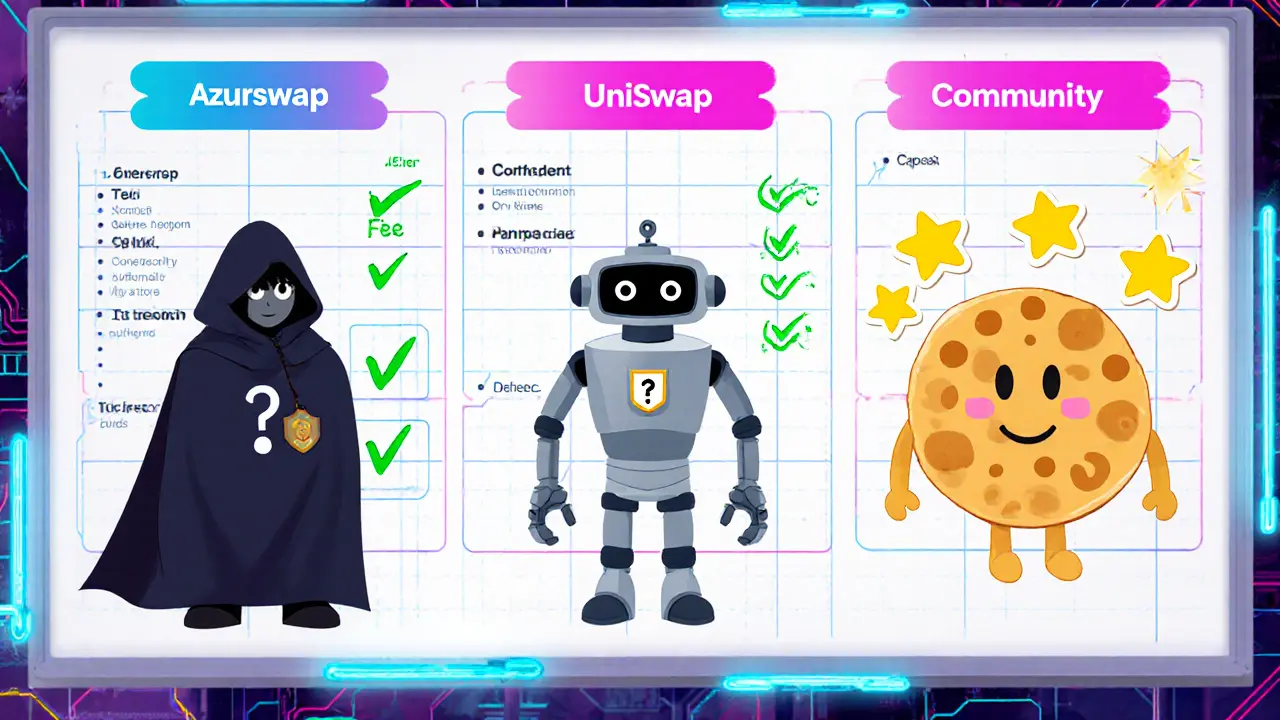
Liquidity, TVL, and Trading Volume
Liquidity determines slippage - the larger the pool, the less your trade moves the price. Total Value Locked (TVL) is the industry’s go‑to metric for DEX health. As of Q32025:
- Uniswap TVL: roughly $4.2billion across all supported chains.
- PancakeSwap TVL: about $1.8billion on BNB Chain.
- Azurswap TVL: not reported - no reliable source provides a number.
Without TVL data, you can’t estimate slippage or gauge whether the platform can handle large orders. Trading volume figures are similarly missing, making it impossible to assess market depth.
Community & User Feedback
A healthy crypto project lives on community chatter - Reddit threads, Discord channels, GitHub activity, and review sites. A search for “Azurswap review” returns virtually no user posts, no rating scores, and no discussion threads. By contrast:
- Uniswap has an active subreddit with >150k members and a Discord buzzing with developers.
- PancakeSwap’s Telegram group counts over 200k members, and its GitHub repo shows frequent commits.
This silence suggests either an extremely new launch, a niche user base, or a lack of adoption.
Pros & Cons at a Glance
| Aspect | Azurswap | Uniswap | PancakeSwap |
|---|---|---|---|
| Supported Networks | Claims many EVM chains (none listed) | Ethereum, Optimism, Arbitrum, Polygon, BNB Chain | BNB Chain, Polygon, Avalanche |
| TVL (approx.) | Not disclosed | $4.2B | $1.8B |
| Swap Fee | Undisclosed | 0.30% | 0.25% |
| Security Audits | None public | Multiple third‑party audits | Audits + bug bounty |
| Community Size | Negligible online presence | Large, active forums | Large, active forums |
Should You Trade on Azurswap?
If you’re a curious explorer who loves testing fresh protocols, you might allocate a tiny slice of your portfolio to Azurswap - but only after doing a small test swap and confirming the contract addresses are correct. For anyone who values:
- Transparent fee calculations,
- Proven liquidity depth,
- Audited smart‑contract code,
- Responsive community support,
the safer bet is to stick with established DEXs. They offer the same multi‑network capabilities (Uniswap now runs on several L2s) and they give you the data you need to trade confidently.
Quick Decision Checklist
- Do you have the technical skill to verify contract code yourself? If not, skip.
- Are you comfortable allocating risk capital to an unreviewed platform? If yes, limit exposure to under 2% of your total holdings.
- Do you need the "most EVM networks" claim? Most traders find the major chains (Ethereum, BNB, Polygon) sufficient.
Frequently Asked Questions
Is Azurswap a legitimate exchange?
Legitimacy is hard to confirm. The platform lacks public audits, fee disclosures, and community chatter, which are standard signs of a trustworthy DEX. Treat it as high‑risk and only use funds you can afford to lose.
What networks does Azurswap actually support?
The website only mentions "multiple EVM networks" without naming them. Users have reported successful swaps on Ethereum and BNB Chain, but without official confirmation you can’t be sure which others are active.
How do Azurswap fees compare to Uniswap?
Uniswap charges a flat 0.30% per swap. Azurswap’s fee structure isn’t published, so any comparison is speculative. Users should assume fees could be equal or higher until proven otherwise.
Is there any KYC requirement on Azurswap?
No KYC policy is listed on the site. As a decentralized protocol, it most likely operates without mandatory verification, but the lack of a clear statement adds uncertainty.
Can I recover funds if I send them to the wrong contract on Azurswap?
No. Like any DEX, transactions are irreversible. Double‑check contract addresses before confirming a swap.
Bottom line: The Azurswap review reveals a platform that’s still a mystery. If you value data, security, and a vibrant community, stick with the proven DEXs. If you’re an adventurous early‑adopter, tread carefully, start small, and keep an eye on any future audit reports or official fee disclosures.


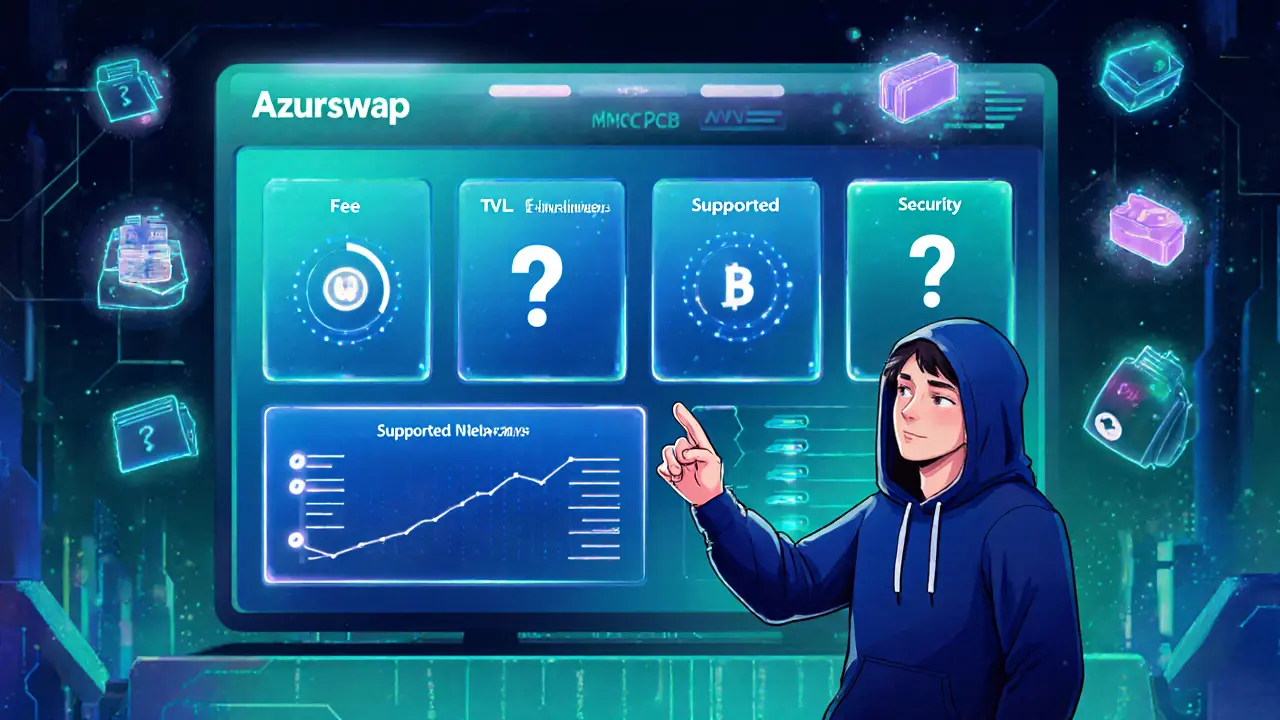
 Finance
Finance
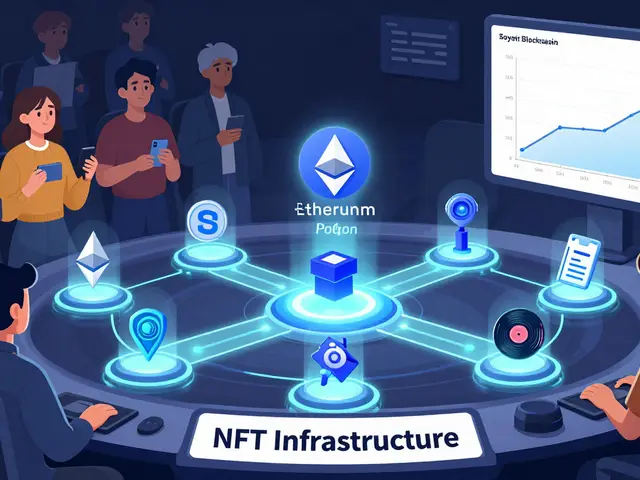

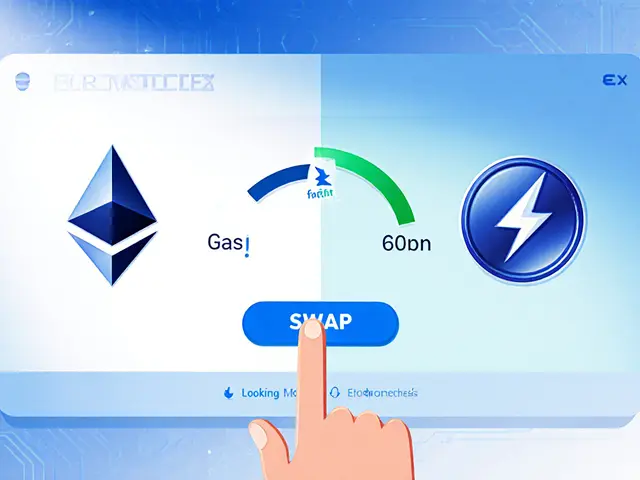

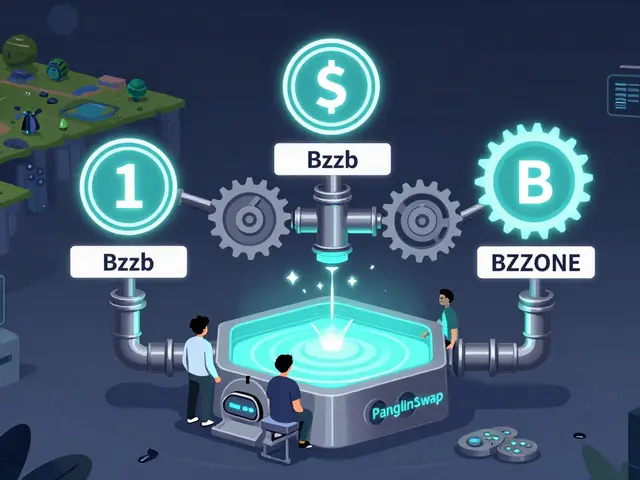
Kevin Fellows
April 29, 2025 AT 16:17Looks promising, but keep the risk low!
mark gray
May 5, 2025 AT 11:10I think the lack of fee info is a real hurdle; if you’re okay with testing small amounts first, you might get a feel for the platform without risking too much.
Alie Thompson
May 11, 2025 AT 06:04The crypto ecosystem thrives on transparency, and any platform that hides its fee structure betrays the very ethos of decentralization.
The users deserve to know exactly what they are paying before they press a button, otherwise they are gambling with hidden costs.
Moreover, the absence of publicly audited smart contracts undermines any claim of security.
When a DEX refuses to publish its audit reports, it essentially asks users to trust a black box.
This is morally questionable because developers wield unchecked power over your funds.
It also sets a dangerous precedent that could normalize secrecy across the industry.
In a space already rife with scams, such opacity is a red flag that should not be ignored.
The community must demand full disclosure as a baseline requirement.
Anything less borders on exploitation, especially when the platform markets itself as low‑fee without proof.
Traders who value fairness should steer clear until concrete data is provided.
You can protect yourself by limiting exposure to an amount you can comfortably lose.
Conducting a small test swap is the only responsible way to gauge the platform’s behavior.
Even then, monitor the contract address closely for any unexpected changes.
If the team remains silent, it is a signal to withdraw and look for reputable alternatives.
Ultimately, the health of decentralized finance depends on collective insistence on openness.
Therefore, treat Azurswap with caution and demand the missing information before committing significant capital.
Christina Norberto
May 17, 2025 AT 00:57From a security standpoint, the complete absence of any publicly verifiable audits creates a breeding ground for undisclosed vulnerabilities; such negligence cannot be dismissed as mere oversight. Furthermore, the platform’s claim of multi‑network support without enumerating the chains raises questions about the underlying contract integrity. The lack of disclosed KYC or AML policies adds another layer of opacity, potentially exposing users to regulatory fallout. In an ecosystem where malicious actors continuously evolve, transparency is the only defense against systemic risk. Consequently, one should regard Azurswap with profound suspicion until it provides verifiable audit documentation.
Fiona Chow
May 22, 2025 AT 19:50Oh, sure, because keeping every detail hidden automatically makes it a cutting‑edge innovation, right? The irony of branding yourself as “low‑fee” while refusing to spell out the numbers is practically a joke.
Mark Briggs
May 28, 2025 AT 14:44Cool story bro no fees disclosed eh
mannu kumar rajpoot
June 3, 2025 AT 09:37Look, I get the hype of “new DEX”, but you’re basically asking us to jump into the dark without a flashlight; that’s not how responsible crypto should work.
Tilly Fluf
June 9, 2025 AT 04:30While optimism is admirable, prudence dictates that any platform lacking fundamental disclosures warrants a cautious approach; a modest test trade may be permissible, yet one should remain prepared to withdraw swiftly.
Darren R.
June 14, 2025 AT 23:24Whoa!!! This whole “no info” thing is like walking into a haunted house with a blindfold!!! Who even thought this was a good idea???!!!
Hardik Kanzariya
June 20, 2025 AT 18:17Hey, I hear you on the alarm bells – you’re absolutely right to be wary. If you do decide to dip a toe in, keep the amount tiny and watch the transaction closely. You’ve got this!
Shanthan Jogavajjala
June 26, 2025 AT 13:10From a technical perspective, the lack of an explicit list of supported EVM chains hampers any deterministic gas‑cost modeling, which is a crucial metric for high‑frequency traders aiming to optimize execution latency.
Millsaps Delaine
July 2, 2025 AT 08:04It is quite evident that the authors of this platform have embarked upon a grandiose venture, one that, in its current incarnation, is shrouded in an unsettling veil of opacity; this deliberate concealment of essential operational metrics-such as fee structures, liquidity depth, and audited security assurances-evinces an unsettling proclivity toward obfuscation. The unabashed omission of these data points not only contravenes the foundational principles of transparency that underpin decentralized finance but also cultivates an environment ripe for speculative exploitation. Consequently, discerning participants would be well advised to scrutinize the platform with a critical eye, lest they become unwitting participants in an experiment lacking the requisite safeguards that are otherwise deemed non‑negotiable within the broader ecosystem.
Jack Fans
July 8, 2025 AT 02:57Hey folks!!! If you're looking for a DEX with solid community support and clear fee info, Uniswap and PancakeSwap are the go‑to choices. Azurswap's mystery‑status makes it a risky play; test with tiny amounts only!!!
Adetoyese Oluyomi-Deji Olugunna
July 13, 2025 AT 21:50Honestly, the whole thing feels like a marketing puff piece with zero substance. If you can’t find any real user feedback, maybe it’s better to stay away.
Krithika Natarajan
July 19, 2025 AT 16:44I think it's safest to avoid platforms that don't share basic info. Stick with proven DEXs.
kishan kumar
July 25, 2025 AT 11:37From a philosophical standpoint, the lack of transparency may indicate an underlying agenda; one might argue that true decentralization requires openness, but alas, the data remains elusive. ¯\_(ツ)_/¯
Vaishnavi Singh
July 31, 2025 AT 06:30Considering the fundamentals of trust and verification, the absence of audits raises a substantial philosophical concern regarding the platform's integrity.
meredith farmer
August 6, 2025 AT 01:24Drama aside, the hidden fees and missing audits are not just minor oversights-they're massive red flags that any serious trader should heed. Don't be fooled by flashy slogans!
Peter Johansson
August 11, 2025 AT 20:17👍 Great points all around! If you decide to experiment, keep it tiny, verify contracts, and stay vigilant. You’ve got this! 😊
Cindy Hernandez
August 17, 2025 AT 15:10In summary, while Azurswap advertises multi‑network support, the lack of disclosed fees, audits, and community activity suggests proceeding with extreme caution. Established DEXs remain the safer choice for most traders.